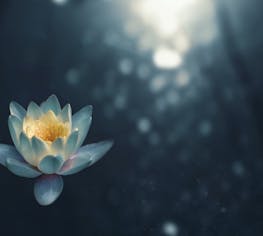What if we could re-make the Earth?
A New Earth examines a world that often feels crazy and chaotic. Eckart Tolle calls on us to transform our consciousness to a more awakened state, in order to create a better world. Consciousness and ego are inextricably linked to life on the planet, so this transformation will significantly impact all life forms.
A New Earth draws on an esoteric biblical interpretation where a "new heaven" is an awakened human consciousness, and a "new earth" is how this carries through into a physical realm. Tolle's approach draws on Christianity and Eastern spirituality, creating a broad spiritual framework to guide readers to their true nature.
Tolle offers two spiritual insights common to ancient religions and spiritual traditions. One is that our minds carry some form of dysfunction. Hinduism calls this "maya," which is the veil of delusion, Buddhism calls it "dukkha," which is suffering, and in Christianity, it's known as "original sin." Original sin is described by the author, as living blindly and missing the point of human existence.
These descriptions of spirituality reflect our unawakened selves, and the many mental processes that trap us. And the author believes that it's these deeply rooted dysfunctions that have caused the wars and genocide of the 20th Century. Furthermore, they can also be held responsible for the violence that continues into the 21st Century. Violence, that has been driven by greed, fear, and a desire for power, could ultimately destroy our planet.
We'll briefly go through the book's insights with the aim to alert us to how we're living in the world, and the effects of dysfunction. We'll learn how to recognize our old, egoic state of consciousness, signifying an awakening of a new consciousness. We'll also look at ideas of enlightenment, the end of suffering, and salvation, all of which have a root in religious teachings. Furthermore we'll look at why the inability to separate from our egos is ultimately what's disconnecting us from ourselves, or what Tolle calls our "Source." Hence, we need to find the goodness that already exists in each of us, but first, we must recognize and deal with our dysfunction.
The Nature of Dysfunction
Our ego keeps us identifying with our thoughts and emotions, external objects, and our external bodies.
Try this for a moment. If you pick up an object, can you look at it without attaching a word to it? Can you notice your wonder as you look at it? As an analogy, think about Van Gogh painting a chair, by looking beyond the chair. Being more aware of how we use words, makes us challenge our reliance on words.
The trouble is that once we use a word, and subscribe a value to something, we automatically believe we know what we're dealing with. As a result, we tend to lose sight of the object's unimaginable depth, and we're faced with a superficial reality. If we're too quick to attach a word as a label, we miss out on the miraculousness of life. Words can imprison us. We then think without awareness, which he believes is a significant challenge we have to overcome for our well-being and that of the planet. The subtle shift is to disconnect from our thoughts, which are always in the foreground, and become aware of the background.
But why do we over-identify with our thoughts? Let's explore some reasons.
The Mind-Made "I"
The word our lives center around, is "I." Placing such an emphasis on the ego, creates a false sense of identity. Albert Einstein calls this an "optical illusion of consciousness," because our thoughts and the accompanying emotions fabricate it. Tolle calls this the false "mind-made I," which is something that develops from birth.
Tolle remembers observing a woman on the subway, who was battling with a mental disorder. She talked to herself incessantly and angrily, and continued to do this for the entire trip. He was wondering about her, when he suddenly realized that he was also talking to himself. It hit home that he was no different from her. All this thinking, and all these words we use to describe our thinking, are just a minuscule part of our consciousness, but they trap us in dysfunction.
Tolle claims that Descartes was wrong when he said, 'I think, therefore I am.' He had instead, identified the basis of ego. On the other hand, Jean-Paul Sartre said, 'the consciousness that says I am, isn't the consciousness that thinks.' So, the instant that you're aware that you're thinking, that awareness isn't part of your thinking. This is a crucial dimension of awakened consciousness.
The Having and the Wanting
The ego also gets caught up in the word "my." The term "my," is attached to feelings of ownership, such as "my car," "my house," "my stuff." We lose ourselves in unhealthy over-identification with our things. He says that we operate based on 'I have; therefore, I am.' He reminds us that most people don't realize that nothing they possess, has anything to do with who they are, until they're on their deathbed. Tolle doesn't ask us to give up on our attachment to things, but simply be aware of it. He explains a new consciousness as, 'I am the awareness that's aware that there's attachment.'
If we think we have a strong need for "having," the "wanting" is even more addictive. The ego, Tolle says, wants to want more than it wants to have. Having is always replaced by more wanting.
The Body
Another form of identification is with the body. This could be in the form of gender identification, appearance, or fitness and health, which forces us into specific roles from early on, influencing all aspects of our lives. However, we can learn to shift from our body's external form, to connect with what it feels like internally. In turn, we can become aware of a powerful inner energy field.
Can you feel the life in your own hands?
Try shifting your attention to your hands. Directly be aware of what's happening, and notice what you feel. Look at all of the elements that make up your hands, and see how they move and experience touch. Then do the same with your feet, and move on to other parts of your body.
Exercises such as this make us more self-aware, they also move us towards formlessness, which he also calls "being."
Our Old Consciousness is Linked to How We React to Others
How we react to others occurs along a spectrum, from fault-finding and complaining, and then to physical violence between individuals, groups, and countries. Complaining about others strengthens our ego, and separates us from others. If we can see someone else's behavior as stemming from their egos, we can learn not to react. Non-reaction to others, is decisive for the Earth, because it ultimately allows the collective human ego to dissolve. It's a strength that brings out the sanity in ourselves and others, which Tolle believes is our most significant protection.
It doesn't mean we can't complain— raising issues about quality is okay, as long as we keep ego out of it. The problem is that our fault-finding is accompanied by resentment, feeling upset, or anger. This builds into grievances, which become collective and develop into a nation's psyche, often causing ongoing violence. Holding onto the ego creates separateness from others, and feelings of superiority. When we complain, we feel that we're right and that others were wrong, which keeps our egos feeling very powerful. In conflict situations, each party believes their own story, and does not want to entertain another narrative. Each is fixed in its truth. We need to be non-reactive to the ego— both our own and someone else's. We can be compassionate when we realize that we're all suffering from the same dysfunction.
Tolle believes that religions, if treated as ideology, will just serve the ego, yet if people move beyond this, all faiths refer to the goodness within. Jesus told of the "Christ within," Buddhists refer to the "Buddha-nature," and Hindus use the term "atman," the "in-dwelling god."
Accepting Dysfunction and Moving to Essential "Beingness"
Tolle remembers reading a sign that was in front of a house that had been destroyed by fire. It read, 'Danger! All structures are unstable.' He believes that if you regard this as a statement about life, some peace arises within you. It may allow us to access what's stable. What's stable is our essential beingness, because this is ever-present in the background of our lives.
However, our egos have so many faces. Perhaps it's a stereotypical role or occupation that we have, that we feel defines who we are. Or maybe it's an over-identification with our parental role, where we're inclined to live through our children.
Even when we just try to be ourselves, we are just adopting another role. But if we can settle into the "now" of any situation, we won't need to be anyone in particular.
Ego Doesn't Like the Present
Have you ever said something like, 'There are things I said, or things I failed to do in the past that are preventing me from being at peace now'? Or maybe you feel there's something that's preventing you from being at peace in the future?
Such feelings represent our timelines. We all sometimes feel some resentment regarding the past or future. To be at peace is to ground your time orientation in the present. The ego doesn't like the present at all, and starts to try to shift you. Noticing your negative state is a successful start. Tolle believes that we want something from this negativity—maybe we benefit from misery, or we gain from making someone else unhappy. If we realize that we quite enjoy this negativity, we're starting to awaken.
This is called the conscious presence that's able to witness. However, we do have moments when we're free of ego. Some people who are exceptionally good at their work, find it at times, to be like a spiritual practice. They're in the Now. If groups such as enlightened businesses, or schools, or communities can grow a new consciousness, they could accelerate a planetary shift.
We Have to Work With Our "Pain-Body"
Our bodies react to dysfunctional thinking with negative emotions. The story we tell ourselves is what the body believes and responds to in the form of emotions. These emotions then feed energy back to the thoughts, and so the vicious cycle continues.
Our bodies have their own intelligence, which allows us to respond to threats or challenges. It's important to differentiate between our automatic response to external danger, and the body's response to a thought. Although intelligent, our bodies can't tell the difference between an event and a thought. Hence, every thought is treated as if it's real, particularly regarding negative emotions.
The build-up of old negative emotional responses, is known as the "pain-body." If we can return our attention to the present moment, instead of listening to our story-telling minds, we can reduce the impact of our pain-body. We all carry some pain from our childhoods. The problem is that our pain-body also triggers the pain-body in others. So when you're in a relationship with someone, you're also in a relationship with their pain body. Some people have pain bodies that seldom rest, and react strongly to what seems insignificant to another. When experiencing others' pain-body, we need to try to stay in the present and resist our own intense reactions. An example of a physical-spiritual practice, that can help lower the pain-body's intensity is Tai Chi, and it can shift a collective energy field.
Breaking Free From the Pain-Body
The first step is to realize that you, and others, have a unique pain-body story. When you know you're feeling the pain-body, you start to lessen this power. Just allowing yourself to feel whatever it is you're feeling in the moment, can bring wholeness.
We can strengthen this wholeness, by acknowledging the abundance within and all around us. We can become givers, even if it's just through greeting a stranger with a smile. We can also learn to be less resistant to our time orientation. J. Krishnamurti, an Indian spiritual teacher, once said, 'My secret is I don't mind what happens.' He was not resistant to what might happen in the future, and did not label things as good or bad.
What relationship do you want with the present moment? If you want to befriend it, you have to make the first move because the ego won't stay in the present moment. The ego treats the present in three ways. Firstly it treats it as a means to an end, because a future moment is more important. Secondly, it can be treated as an obstacle; in other words, there's a problem that needs to be solved before you can be happy. And thirdly, it can be viewed as the enemy, where you hate what you do, and where you are. We need to decide which of these apply to us. Furthermore, we need to consider psychological time, which looks at how we move between the past, the present, and the future.
Being in the Now Allows Us to Recognize Space Consciousness
When we look up into the sky at night, we realize we have an affinity for space, its essence of nothingness, and it's silence and depth. It helps us recognize our own inner depth and space. We have to balance this consciousness of space with our clutter of thoughts. If we can see the inner stillness in the background while things are happening in the foreground, we become awakened. The space between our thoughts can be found in ordinary things - the sound of the rain, noticing the movement of clouds in the sky, or being kind to a stranger. But to be aware requires inner stillness. The advice here is to 'Be still. Look. Listen. Be present.'
Look at an object close by, such as a pen or cup. Look with curiosity, but don't get caught in your thoughts about this object. Expand this by taking in objects around the room. Then listen to sounds without labeling them as pleasant or irritating. Doing this exercise may make you aware of a sense of stillness in the background—a peaceful inner space. Use your breath to take your attention away from your thinking. Also, try to become aware of the spaciousness of your inner body.
In Conclusion
We have an inner and outer purpose. Our inner purpose is our new consciousness and consists of three things: acceptance, enjoyment, and enthusiasm. Acceptance is knowing that something is required from you to do with equanimity; enjoyment brings aliveness to what you do, and enthusiasm keeps you in the present, and points the way to the future.
Tolle believes that this new and awakened consciousness, can change all aspects of life on our planet. An awakened consciousness shows that life on Earth can't be separated from human consciousness. This is reflected in Tolle's following quote, 'seeing beauty in a flower could awaken humans, however briefly, to the beauty that is an essential part of their own innermost being, their true nature.'
They say that change begins at home. Tolle asserts that if we change ourselves and our own consciousness, this will quite literally change the world.




